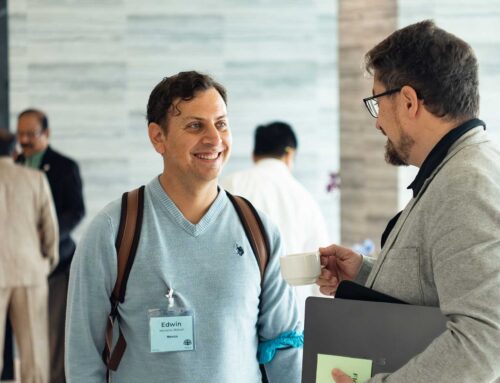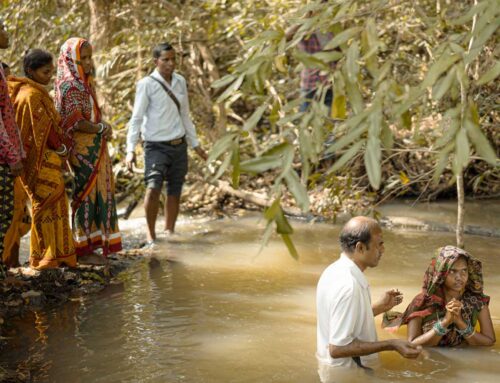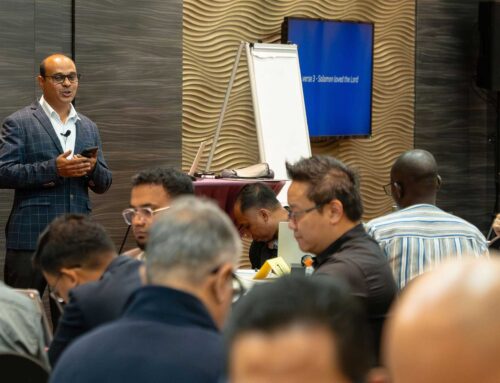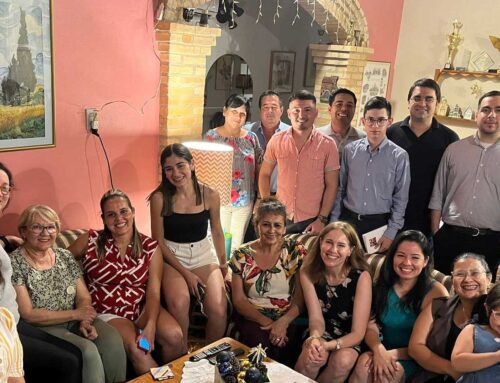Trail-Blazing, Holistic Discipleship
Haggai International has been a trail-blazing organization since its inception in 1969, when Dr. Haggai, fearing the impact of decolonization on the Western missionary-sending model, moved toward a model of equipping indigenous leaders to share the Gospel in their communities. What began as an obedient response to God’s call on his life has become a global organization with a bedrock of more than 130,000 leaders equipped in 189 nations for more effective Gospel ministry.
What I have long since loved about Haggai is our holistic, common-sense approach. Rather than equipping leaders and urging them to immediately start their own ministries or venture out on their own, Haggai encourages leaders to first invest the knowledge and skills they gained through their equipping back into their communities, organizations, and careers. Leaders become more committed to their local church; lead by example in their workplaces; seek the flourishing of their cities; and share the Gospel with their families and neighbors.
One benefit of this practical approach is that Haggai leaders are free to be ecumenical as they work to end Gospel poverty. Many different churches and denominations often gather with Haggai leaders at the center — we’ve seen it time and time again through national ministries! Collaboration is a strategy we implement in all our equipping because we know the Gospel can be furthered when we unite.
We recently saw this power of collaboration during a vibrant celebration in Argentina. Latin American and Caribbean Haggai leaders have created flourishing national ministries to ensure their equipping is passed on as they work to end Gospel poverty on their continent. In September, leaders equipped both through the Haggai Leader Experience and national seminars united to share key strategies, encouraging stories, and renewed commitments. Leaders flew in from all over the continent, and Haggai’s chief international operations officer Lee Cunningham and vice president of international ministry development Sundar Sangma were honored to be a part of the program.
This is the beauty of alumni associations and national ministries: They embrace the vision of Haggai International and offer equipping that drives our mission forward. Through national ministry, leaders unable to attend a Haggai Leader Experience can still receive a world-class equipping experience — often in their own language and through curricula tailored even more specifically to the needs of their cultures or professions.
“Equipping others to do the same” is no longer a background detail: it is a key strategy in preparing more leaders to share the Gospel. The outcomes — in sharing the Good News, Christian influence, and ending Gospel poverty — are huge. God is making a way.
For the Gospel,


Dr. Bev Williams
CEO, Haggai International
Trail-Blazing, Holistic Discipleship
Haggai International has been a trail-blazing organization since its inception in 1969, when Dr. Haggai, fearing the impact of decolonization on the Western missionary-sending model, moved toward a model of equipping indigenous leaders to share the Gospel in their communities. What began as an obedient response to God’s call on his life has become a global organization with a bedrock of more than 130,000 leaders equipped in 189 nations for more effective Gospel ministry.
What I have long since loved about Haggai is our holistic, common-sense approach. Rather than equipping leaders and urging them to immediately start their own ministries or venture out on their own, Haggai encourages leaders to first invest the knowledge and skills they gained through their equipping back into their communities, organizations, and careers. Leaders become more committed to their local church; lead by example in their workplaces; seek the flourishing of their cities; and share the Gospel with their families and neighbors.
One benefit of this practical approach is that Haggai leaders are free to be ecumenical as they work to end Gospel poverty. Many different churches and denominations often gather with Haggai leaders at the center — we’ve seen it time and time again through national ministries! Collaboration is a strategy we implement in all our equipping because we know the Gospel can be furthered when we unite.
We recently saw this power of collaboration during a vibrant celebration in Argentina. Latin American and Caribbean Haggai leaders have created flourishing national ministries to ensure their equipping is passed on as they work to end Gospel poverty on their continent. In September, leaders equipped both through the Haggai Leader Experience and national seminars united to share key strategies, encouraging stories, and renewed commitments. Leaders flew in from all over the continent, and Haggai’s chief international operations officer Lee Cunningham and vice president of international ministry development Sundar Sangma were honored to be a part of the program.
This is the beauty of alumni associations and national ministries: They embrace the vision of Haggai International and offer equipping that drives our mission forward. Through national ministry, leaders unable to attend a Haggai Leader Experience can still receive a world-class equipping experience — often in their own language and through curricula tailored even more specifically to the needs of their cultures or professions.
“Equipping others to do the same” is no longer a background detail: it is a key strategy in preparing more leaders to share the Gospel. The outcomes — in sharing the Good News, Christian influence, and ending Gospel poverty — are huge. God is making a way.
For the Gospel,


Dr. Bev Williams
CEO, Haggai International
Trail-Blazing, Holistic Discipleship
Haggai International has been a trail-blazing organization since its inception in 1969, when Dr. Haggai, fearing the impact of decolonization on the Western missionary-sending model, moved toward a model of equipping indigenous leaders to share the Gospel in their communities. What began as an obedient response to God’s call on his life has become a global organization with a bedrock of more than 130,000 leaders equipped in 189 nations for more effective Gospel ministry.
What I have long since loved about Haggai is our holistic, common-sense approach. Rather than equipping leaders and urging them to immediately start their own ministries or venture out on their own, Haggai encourages leaders to first invest the knowledge and skills they gained through their equipping back into their communities, organizations, and careers. Leaders become more committed to their local church; lead by example in their workplaces; seek the flourishing of their cities; and share the Gospel with their families and neighbors.
One benefit of this practical approach is that Haggai leaders are free to be ecumenical as they work to end Gospel poverty. Many different churches and denominations often gather with Haggai leaders at the center — we’ve seen it time and time again through national ministries! Collaboration is a strategy we implement in all our equipping because we know the Gospel can be furthered when we unite.
We recently saw this power of collaboration during a vibrant celebration in Argentina. Latin American and Caribbean Haggai leaders have created flourishing national ministries to ensure their equipping is passed on as they work to end Gospel poverty on their continent. In September, leaders equipped both through the Haggai Leader Experience and national seminars united to share key strategies, encouraging stories, and renewed commitments. Leaders flew in from all over the continent, and Haggai’s chief international operations officer Lee Cunningham and vice president of international ministry development Sundar Sangma were honored to be a part of the program.
This is the beauty of alumni associations and national ministries: They embrace the vision of Haggai International and offer equipping that drives our mission forward. Through national ministry, leaders unable to attend a Haggai Leader Experience can still receive a world-class equipping experience — often in their own language and through curricula tailored even more specifically to the needs of their cultures or professions.
“Equipping others to do the same” is no longer a background detail: it is a key strategy in preparing more leaders to share the Gospel. The outcomes — in sharing the Good News, Christian influence, and ending Gospel poverty — are huge. God is making a way.
For the Gospel,


Dr. Bev Williams
CEO, Haggai International















